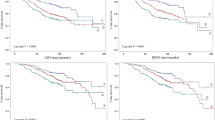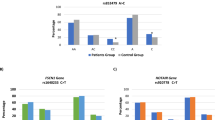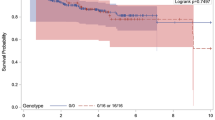Abstract
XPG polymorphisms are associated with varied clinical outcomes in different cancers but up-till now no study has been reported on breast cancer. Therefore, current study was aimed to explore the association of breast cancer risk factors and XPG polymorphisms (rs2296147 and rs1047768). It also investigated impact of XPG variants on overall survival and progression free survival among breast cancer cases. A total of 493 histopathologically identified breast cancer cases and 387 healthy females were genotyped by ARMS–PCR. Relationship between general characteristics, XPG polymorphisms and breast cancer risk was accessed by conditional logistic regression and illustrated by OR and 95% CI. Kaplan Meier test was applied to estimate survival distributions whereas log rank test demonstrated survival differences. Association of XPG variants with OS and PFS in breast cancer was illustrated by HR and 95% CI. Early onset of menopause, consanguinity and family history contributed (P < 0.05) towards breast cancer development. Both rs2296147 and rs1047768 SNPs were found to be associated (P < 0.05) with the risk of breast cancer. XPG rs1047768 was significantly associated with decreased PFS (HR 1.72; 95% CI 1.0–2.8) in breast cancer cases (P = 0.013) which was demonstrated by median time of 26 months for T > C variant when compared with median time of 37 months for TT genotype. No association was found between XPG rs2296147 polymorphism and survival analysis among breast cancer cases. XPG (rs1047768 T > C) variant may play a significant role in terms of decreased PFS and could be used as a predictor of unfavourable prognosis among breast cancer.


Similar content being viewed by others
References
Siegel RL, Miller KD, Jemal A (2018) Cancer statistics, 2018. CA Cancer J Clin 68(1):7–30. https://doi.org/10.3322/caac.21442
Menhas R, Umer S (2015) Breast cancer among Pakistani women. Iran J Public Health 44(4):586–587
Ghoncheh M, Momenimovahed Z, Salehiniya H (2016) Epidemiology, incidence and mortality of breast cancer in Asia. Asian Pac J Cancer Prev 17(S3):47–52
Rudolph A, Chang-Claude J, Schmidt MK (2016) Gene-environment interaction and risk of breast cancer. Br J Cancer 114(2):125–133. https://doi.org/10.1038/bjc.2015.439
Jeggo PA, Pearl LH, Carr AM (2016) DNA repair, genome stability and cancer: a historical perspective. Nat Rev Cancer 16(1):35–42. https://doi.org/10.1038/nrc.2015.4
Du H, Zhang X, Du M, Guo N, Chen Z, Shu Y, Zhang Z, Wang M, Zhu L (2014) Association study between XPG Asp1104His polymorphism and colorectal cancer risk in a Chinese population. Sci Rep 4:6700. https://doi.org/10.1038/srep06700
Han C, Huang X, Hua R, Song S, Lyu L, Ta N, Zhu J, Zhang P (2017) The association between XPG polymorphisms and cancer susceptibility: evidence from observational studies. Medicine (Baltimore) 96(32):e7467. https://doi.org/10.1097/MD.0000000000007467
Sun X-H, Hou W-G, Zhao H-X, Zhao Y-L, Ma C, Liu Y (2013) Single nucleotide polymorphisms in the NER pathway and clinical outcome of patients with bone malignant tumor. Asian Pac J Cancer Prev 14(3):2049–2052. https://doi.org/10.7314/apjcp.2013.14.3.2049
Na N, Dun E, Ren L, Li G (2015) Association between ERCC5 gene polymorphisms and breast cancer risk. Int J Clin Exp Pathol 8(3):3192
Wang F, Zhang S-D, Xu H-M, Zhu J-H, Hua R-X, Xue W-Q, Li X-Z, Wang T-M, He J, Jia W-H (2016) XPG rs2296147 T> C polymorphism predicted clinical outcome in colorectal cancer. Oncotarget 7(10):11724–11732. https://doi.org/10.18632/oncotarget.7352
Yuli Y, Zhe S, Xia W, Siqing LI, Zhenxuan WU, Yu-hua ZHU, Bing S, Jun-wei C (2013) XPG is a novel biomarker of clinical outcome in advanced non-small-cell lung cancer. Pakistan J Med Sci 29(3):762–767
Ye S, Dhillon S, Ke X, Collins AR, Day IN (2001) An efficient procedure for genotyping single nucleotide polymorphisms. Nucleic Acids Res 29(17):E88–E88
Malik SS, Masood N, Yasmin A (2015) Prostate cancer and glutathione S-transferase deletions. EXCLI J 14:1049–1054. https://doi.org/10.17179/excli2015-192
Medrano RF, de Oliveira CA (2014) Guidelines for the tetra-primer ARMS-PCR technique development. Mol Biotechnol 56(7):599–608. https://doi.org/10.1007/s12033-014-9734-4
Duan Z, He C, Gong Y, Li P, Xu Q, Sun LP, Wang Z, Xing C, Yuan Y (2012) Promoter polymorphisms in DNA repair gene ERCC5 and susceptibility to gastric cancer in Chinese. Gene 511(2):274–279. https://doi.org/10.1016/j.gene.2012.09.025
Haber G, Ahmed NU, Pekovic V (2012) Family history of cancer and its association with breast cancer risk perception and repeat mammography. Am J Public Health 102(12):2322–2329. https://doi.org/10.2105/AJPH.2012.300786
Mavaddat N, Pharoah PD, Michailidou K, Tyrer J, Brook MN, Bolla MK, Wang Q, Dennis J, Dunning AM, Shah M (2015) Prediction of breast cancer risk based on profiling with common genetic variants. JNCI: J Natl Cancer Inst. https://doi.org/10.1093/jnci/djv036
Chollet-Hinton L, Anders CK, Tse C-K, Bell MB, Yang YC, Carey LA, Olshan AF, Troester MA (2016) Breast cancer biologic and etiologic heterogeneity by young age and menopausal status in the Carolina Breast Cancer Study: a case-control study. Breast Cancer Res 18(1):79. https://doi.org/10.1186/s13058-016-0736-y
Bener A, Çatan F, El Ayoubi HR, Acar A, Ibrahim WH (2017) Assessing breast cancer risk estimates based on the Gail model and its predictors in Qatari women. J Prim Care Community Health 8(3):180–187
Yuli Y, Zhe S, Xia W, Siqing L, Zhenxuan W, Yu-hua Z, Bing S, Jun-wei C (2013) XPG is a novel biomarker of clinical outcome in advanced non-small-cell lung cancer. Pak J Med Sci 29(3):762
Xue M-H, Li G-Y, Wu X-J, Zhang C-X, Zhang C-F, Zhu K-X (2015) Genetic variability of genes in NER pathway influences the treatment outcome of gastric cancer. Int J Clin Exp Pathol 8(5):5563
Liang Y, Deng J, Xiong Y, Wang S, Xiong W (2014) Genetic association between ERCC5 rs17655 polymorphism and lung cancer risk: evidence based on a meta-analysis. Tumor Biol 35(6):5613–5618
Lu B, Li J, Gao Q, Yu W, Yang Q, Li X (2014) Laryngeal cancer risk and common single nucleotide polymorphisms in nucleotide excision repair pathway genes ERCC1, ERCC2, ERCC3, ERCC4, ERCC5 and XPA. Gene 542(1):64–68. https://doi.org/10.1016/j.gene.2014.02.043
Zhang T, Sun J, Lv M, Zhang L, Wang X, Ren J-C, Wang B (2013) XPG is predictive gene of clinical outcome in advanced non-small-cell lung cancer with platinum drug therapy. Asian Pac J Cancer Prev 14(2):701–705
Zavras AI, Yoon AJ, Chen MK, Lin CW, Yang SF (2012) Association between polymorphisms of DNA repair gene ERCC5 and oral squamous cell carcinoma. Oral Surg Oral Med Oral Pathol Oral Radiol 114(5):624–629. https://doi.org/10.1016/j.oooo.2012.05.013
He XF, Liu LR, Wei W, Liu Y, Su J, Wang SL, Shen XL, Yang XB (2014) Association between the XPG Asp1104His and XPF Arg415Gln polymorphisms and risk of cancer: a meta-analysis. PLoS ONE 9(5):e88490. https://doi.org/10.1371/journal.pone.0088490
Zhu M-L, Wang M, Cao Z-G, He J, Shi T-Y, Xia K-Q, Qiu L-X, Wei Q-Y (2012) Association between the ERCC5 Asp1104His polymorphism and cancer risk: a meta-analysis. PLoS ONE 7(7):e36293
Acknowledgements
I would like to thank all my patients, their family members and colleagues at Armed Forces Institute of Pathology for their kind help and support.
Author information
Authors and Affiliations
Corresponding author
Ethics declarations
Conflict of interest
The authors declare that they have no conflict of interest.
Rights and permissions
About this article
Cite this article
Malik, S.S., Mubarik, S., Masood, N. et al. An insight into clinical outcome of XPG polymorphisms in breast cancer. Mol Biol Rep 45, 2369–2375 (2018). https://doi.org/10.1007/s11033-018-4401-7
Received:
Accepted:
Published:
Issue Date:
DOI: https://doi.org/10.1007/s11033-018-4401-7




